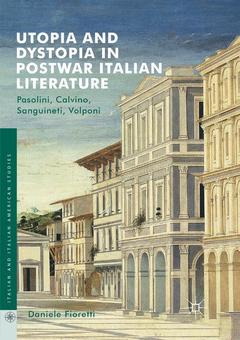Description
Utopia and Dystopia in Postwar Italian Literature, Softcover reprint of the original 1st ed. 2017
Pasolini, Calvino, Sanguineti, Volponi
Italian and Italian American Studies Series
Author: Fioretti Daniele
Language: English
Keywords
World War II; Soviet Union; New Avant-garde; Neo-Experimentalism; Marxism; Ideology
Utopia and Dystopia in Postwar Italian Literature
Publication date: 07-2018
Support: Print on demand
Publication date: 07-2018
Support: Print on demand
Utopia and Dystopia in Postwar Italian Literature
Publication date: 02-2017
Support: Print on demand
Publication date: 02-2017
Support: Print on demand
Description
/li>Contents
/li>Biography
/li>Comment
/li>
This book is about the presence of utopian and dystopian elements in the Italian literary landscape. It focuses on four authors that are representatives of the various positions in the Italian cultural debate: Pasolini, Calvino, Sanguineti, and Volponi. What did concepts like utopia and dystopia mean for these authors? Is it possible to separate utopia from dystopia? What is the role of science fiction in this debate? This book answers these questions, proposing an original interpretation of utopia and of the social role of literature. The book also takes into consideration four of the most influential literary journals in Italy: Officina, il menabò, il verri, and Nuovi Argomenti, that played a central role in the cultural and political debate on utopia in Italy.
Introduction.- Chapter 1. The Theoretical Landscape.- Chapter 2. Pier Paolo Pasolini: The Contradictions of Utopia.- Chapter 3. Italo Calvino: A Reasonable Utopia.- Chapter 4. The World as a Marsh: Dystopia and Utopia in Edoardo Sanguineti.- Chapter 5. Utopia and Hybridization in Paolo Volponi.- Conclusion.- Bibliography.- Index.
Daniele Fioretti teaches at Miami University, USA. He holds a Dottorato di Ricerca from the Università di Firenze and a PhD from the University of Wisconsin-Madison. He has published a collection of letters from Paolo Volponi to Pier Paolo Pasolini: Paolo Volponi, Scrivo a te come guardandomi allo specchio. Lettere a Pasolini 1954-1975 (2009). He also co-edited Il romanzo di formazione nell’Ottocento e nel Novecento (2007) with Maria Carla Papini and Teresa Spignoli. His latest book is Carte di fabbrica. La narrativa industriale in Italia 1934-1989 (2013).
Examines left-wing Italian literature during the 1960s and beyond - an area of increasing scholarly interest Considers Pasolini, Calvino, Sanguineti, and Volponi together for the first time Looks at a wide range of texts, from novels and poetry to journalism and literary essays
© 2024 LAVOISIER S.A.S.
These books may interest you

Character and DystopiaThe Last Men 160.25 €



